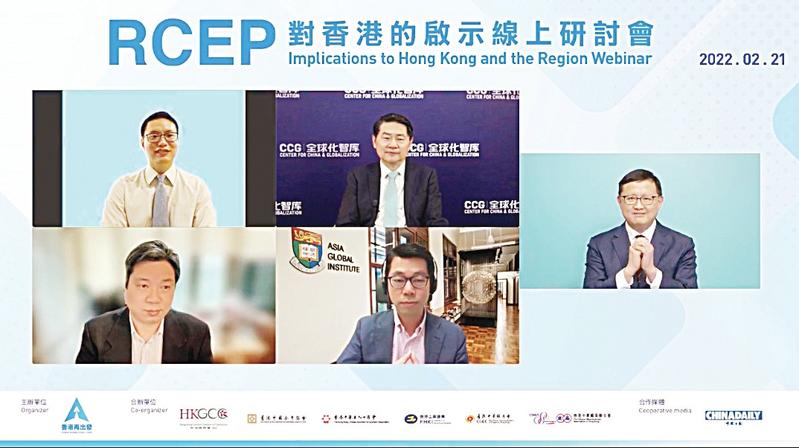 Lawmaker Kennedy Wong Ying-ho (right) on Monday moderated a webinar entitled “RCEP Implications to Hong Kong and the Region”, attended by leading economics experts — Patrick Lau Hui-ping (top row, left), deputy executive director of the Hong Kong Trade Development Council, Wang Huiyao (top row, center), founder and president of think tank Center for China and Globalization, Zhu Haibin (bottom row, left), managing director, chief China economist and head of greater China economic research at JP Morgan, Tang Hei-wai(bottom row, center), professor of economics at HKU Business School and associate director of the Hong Kong Institute of Economics and Business Strategy. (PHOTO PROVIDED TO CHINA DAILY)
Lawmaker Kennedy Wong Ying-ho (right) on Monday moderated a webinar entitled “RCEP Implications to Hong Kong and the Region”, attended by leading economics experts — Patrick Lau Hui-ping (top row, left), deputy executive director of the Hong Kong Trade Development Council, Wang Huiyao (top row, center), founder and president of think tank Center for China and Globalization, Zhu Haibin (bottom row, left), managing director, chief China economist and head of greater China economic research at JP Morgan, Tang Hei-wai(bottom row, center), professor of economics at HKU Business School and associate director of the Hong Kong Institute of Economics and Business Strategy. (PHOTO PROVIDED TO CHINA DAILY)
Hong Kong can envisage becoming a financial services and professional services hub for the whole Regional Comprehensive Economic Partnership region, as the world’s largest free trade agreement is poised to spur inter-regional trade, panelists told an RCEP webinar organized by the Hong Kong Coalition on Monday.
The RCEP, which came into effect last month, is expected to enhance cross-border investment, bolster regional flows of talent and data, as well as strengthen global supply chain reconfiguration, the panelists said.
The agreement covers 30 percent of global GDP, 30 percent of the world’s population and 27 percent of global trade. The 15 participating economies are the 10 Association of Southeast Asian countries, Australia, China, Japan, New Zealand and South Korea.
The agreement covers 30 percent of global GDP, 30 percent of the world’s population and 27 percent of global trade. The 15 participating economies are the 10 Association of Southeast Asian countries, Australia, China, Japan, New Zealand and South Korea.
Major milestones of the RCEP agreement include eliminating 92 percent of trade tariffs, opening up 65 percent of the services sector, aligning different rules and origins into one RCEP framework, and other trade and investment facilitation measures.
ALSO READ: Hong Kong gets central backing to join RCEP
“The RCEP is the modern, comprehensive and win-win trade agreement,” Director-General of Trade and Industry Brian Lo Sai-hung said in the keynote speech session.
“The agreement enables Hong Kong to integrate further into the overall industrial chains and also benefit from a reduction of tariffs, market access, elimination of trade barriers, and simplification of customs arrangements, so that trading cost can be lower and then there will be more opportunities for Hong Kong businesses.”
Lo added that the Hong Kong government will keep in close contact with RCEP members and will strive to join at the earliest opportunity.
Wang Huiyao, founder and president of think tank the Center for China and Globalization, said that Hong Kong can become the financial center for the RCEP because the city has a very convenient trade and investment mechanism and facilities.
ALSO READ: Commerce Ministry supports Hong Kong SAR joining RCEP
“And that there will be the reorganization, restructuring of industrial or value chains, especially about trade of services, we can find our appropriate role. Hong Kong can pool its resources to build a research center, and the second suggestion is to build an international talent center in the city,” Wang noted.
Tang Heiwai, an economics professor at HKU Business School and associate director of the Hong Kong Institute of Economics and Business Strategy, said Hong Kong should strive to become the legal assistance center for RCEP economies and continue to strengthen its role as an offshore renminbi financing center. The city should also mull how to cement its roles in big data business and nurture an innovative startup ecosystem.
“There will be some non-trade benefits for Hong Kong as an RCEP member,” said Tang. “As a high-end services center in the world, Hong Kong should explore more on how to capitalize on its strengths. We can realize our soft power more.”
Hong Kong Trade Development Council Deputy Executive Director Patrick Lau Hui-ping added: “Mainland enterprises want to go abroad as they have the aspiration of internationalization. Hong Kong business can help mainland businesses as a business adviser, and at the time Hong Kong can facilitate deals by identifying projects. There will be a tripartite collaboration to work on investment projects.”
READ MORE: RCEP seen giving post-pandemic boost to HK economy
Lau said he believes that ASEAN countries offer much business potential for Hong Kong service providers in areas such as infrastructure facilities upgrades, smart city solutions, innovative technology and professional services. The RCEP would be a very big market for Hong Kong businesses working on offshore trading, he added.
“The RCEP is going to be gradual evolution instead of from zero to one,” said Zhu Haibin, managing director, chief China economist and head of greater China economic research at JP Morgan. “We want to look at the integration of Asia as a whole and the rise of Asia. How can we make better use of this opportunity to improve development of the Chinese mainland and Hong Kong? That should be the focus.”


